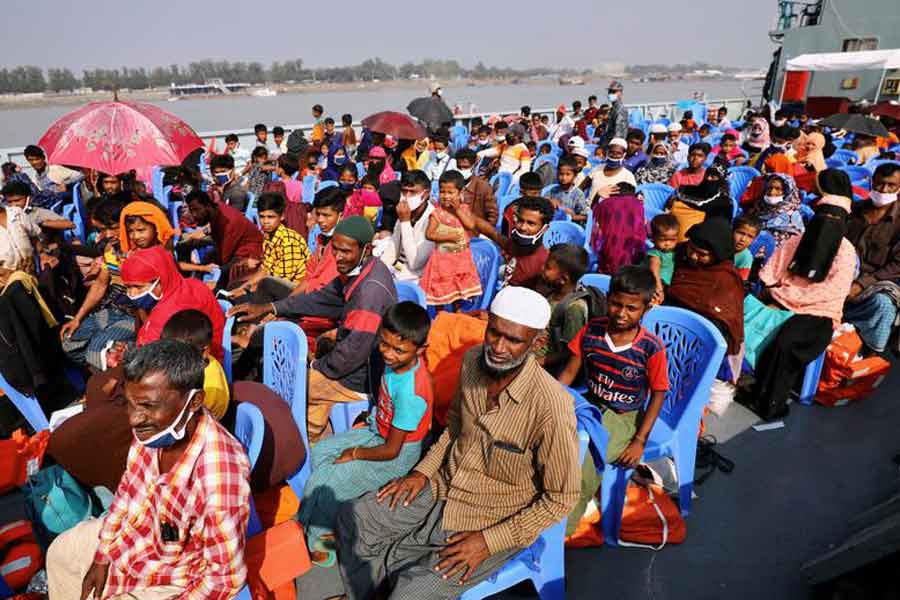
Published :
Updated :

On the sidelines of the 6th BIMSTEC summit in Bangkok, the Myanmar foreign minister U Than Swe reportedly informed Chief Adviser (CA) Dr Yunus's high representative, Dr Khalilur Rahman that the Myanmar authorities had identified 180,000 Rohingya individuals as 'eligible' for returning to Myanmar out of a list of 800,000 (according to Myanmar authorities) sheltered in Bangladesh. However, the fact remains that over 1.2 million Rohingya people have been living in cramped conditions in the refugee camps of Cox's Bazar. To add to their woes, some 80,000 additional Rohingya people joined them since August 2024, as fresh violence erupted in Rakhine State of Myanmar. So, the figure of 800,000 refugees sheltered in refugee camps in Bangladesh is a sham and hence unacceptable. Notably, the original list of Rohingya people that sought refuge in Bangladesh following Myanmar military's genocidal crackdown on the Rohingya community in that country's Rakhine State in August 2017, was given to the Myanmar government in six phases between 2018 and 2020.
The Myanmar authorities, according to the press wing of CA, would be conducting scrutiny, verification, etc., of another 70,000 Rohingya people soon. When the international community has condemned the Myanmar military's action against the Rohingya people as genocidal, they had the cheek to ask the then-government of Bangladesh to allow them (Myanmar government's representatives) to conduct scrutiny of the victims of their ethnic cleansing to see if they were 'eligible' for repatriation in Myanmar. Now when they (Myanmar military) have practically lost control of some 90 per cent of Rakhine State to the rebel Arakan Army (AA), the Myanmar government is behaving as if nothing has happened meanwhile and that they are still on top and can dictate terms regarding repatriation of their so-called 'eligible' Rohingya members from Bangladesh! As things stands, one wonders, what the Nay Pyi Taw authorities would do with the 'eligible' Rohingya members, even if the latter agree to the former's proposal of repatriation. The question arises because the military junta is currently in no position to rehabilitate the repatriated Rohingya members keeping the Arakan Army (AA) out of the picture. But junta government at the moment does not recognize the AA as the legitimate authority of Rakhine State. In that case, the junta's present offer of Rohingya repatriation needs to be taken with a pinch of salt. In this connection, one might recall a recent report of Human Rights Watch (HRW), in which it claimed that the Myanmar military had abducted 1,000 Rohingya men and boys as part of their forcible recruitment of Rohingya people in total violation of conscription law and prohibition on child soldiers. The Myanmar military rulers had been carrying out this illegal act since February 2024. Strangely though, in this case, the Myanmar junta, if at all it is following any law, it is then using a conscription law that only applies to the Myanmar citizens. But Rohingya people do not fall under this conscription law since they are not recognised as Myanmar's citizen under the country's 1982 citizenship law. In fact, what is now happening with the remaining Rohingya population in Myanmar is more sinister.
As reports go, Rohingya men and boys are being forcibly recruited either through the false promise of citizenship, or threatened with arrest or picked up in nighttime raids and then forced to undergo another round of abuse in the name of training for two weeks before sending them to the front to fight against the Arakan Army. Through this nefarious tactics, the Myanmar junta is killing two birds with one stone. On the one hand, the Rohingya people being so recruited under duress are after all getting killed (which the Myanmar authority wants) at the front and is further intensifying the AA's animosity towards the Rohingya, on the other. It has actually been the case since May 2024, when tens of thousands of Rohingya were forced to flee their homes from the townships of Buthidaung and Maungdaw in the Rakhine state as the rebels AA took over those settlements following withdrawal of the junta army. UN reports said, killing of Rohingya civilians and torching of their homes in those townships started as AA advanced in those townships following vacation of those by the Myanmar army. Clearly, the situation has come to such a pass that the Rohingya are now common target of both the Tatmadaw (Myanmar army) and the AA. This is very unfortunate and would prove to be a big barrier to future repatriation of the Rohingya to their ancestral homeland in the Rakhine. Under the circumstances, the incumbent interim government will have to give up the idea of resolving Rohingya issue by simply making any deal with the junta in Nay Pyi Taw alone. The emergence of the Arakan Army (AA) on the scene is a force to be reckoned with.
So, the government should not avoid creating a communication channel with the AA on the ground that they are a non-state actor. History provides ample instances of how once-non-state actors become state actors in the long run. The way the Myanmar junta is losing its grip on Rakhine State, which is the ancestral home of the Rohingya and the AA taking control of district after district, the latter, to all appearances, is now de facto ruler of Raknine State. The interim government will have to consider AA's role in the emerging scenario in any plan for Rohingya repatriation.


 For all latest news, follow The Financial Express Google News channel.
For all latest news, follow The Financial Express Google News channel.